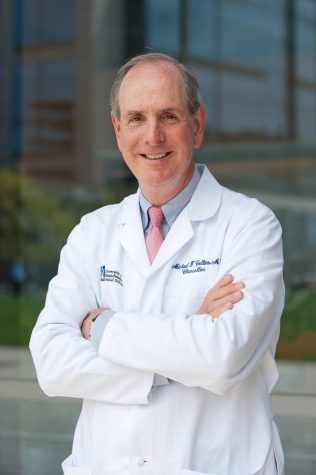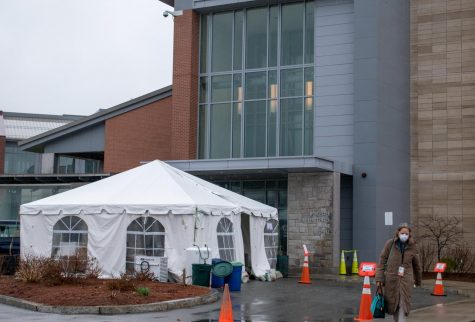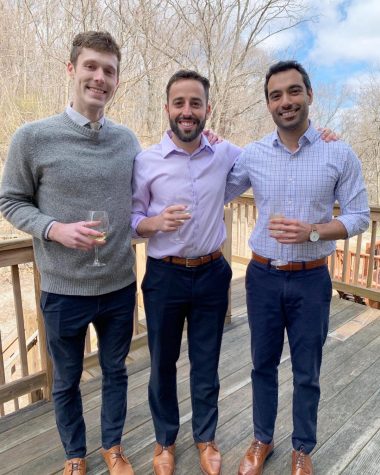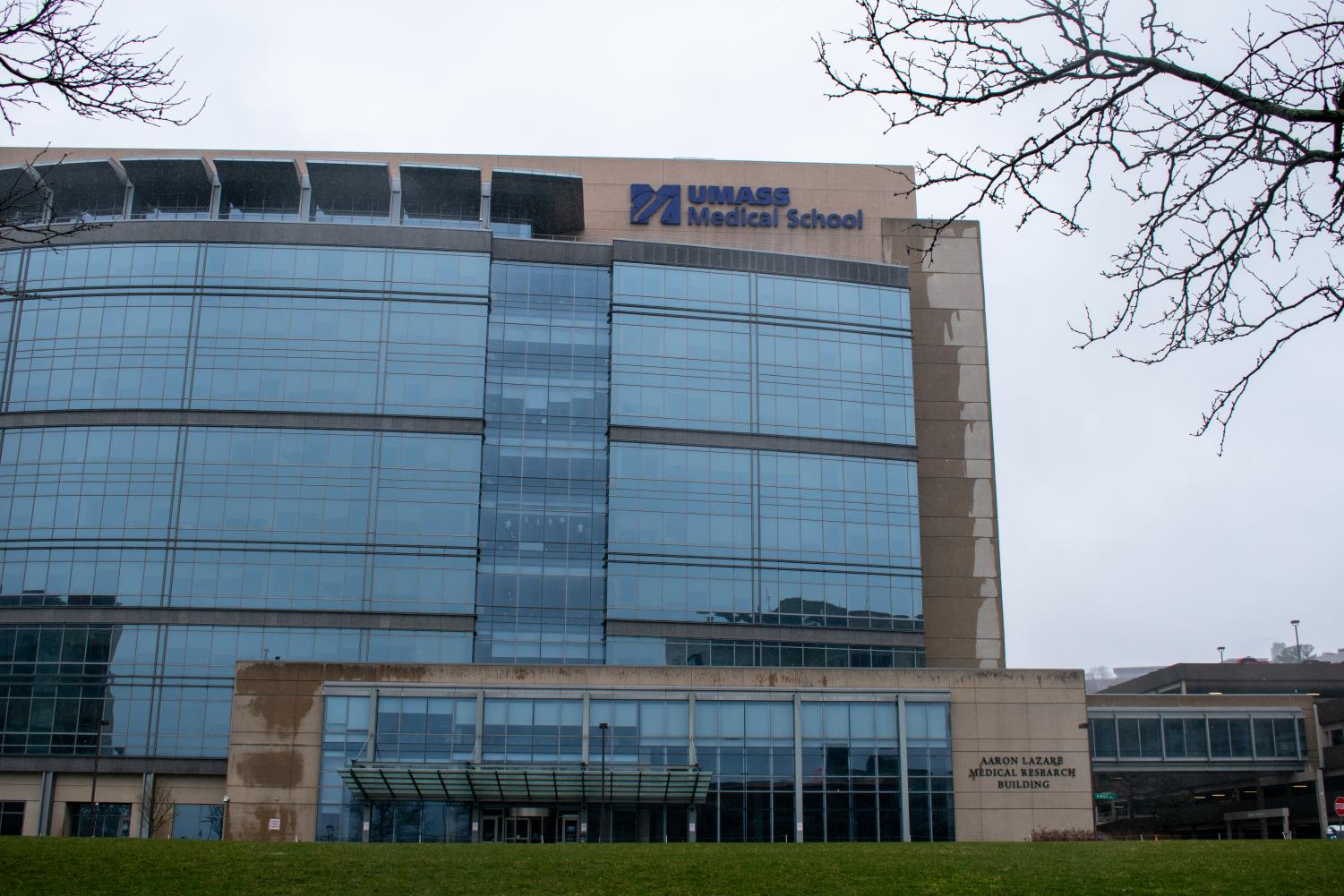UMass Medical School’s recent graduates are getting to work
With hospitals struggling under the weight of new coronavirus patients, Massachusetts medical school students in the class of 2020 will be able to lend a hand
April 8, 2020
In mid-March, as the coronavirus began its spread across Massachusetts, officials were watching the state’s surge capacity – how many patients the state could accommodate in the event of mass infection surpassing normal hospital capacity.
If there were a surge of cases, the state needed a place to treat them. It would need personal protective equipment and ventilators. And the state would need health care workers that could come to the aid of those already treating patients.
In talks between Governor Charlie Baker’s office and the University of Massachusetts Medical School, an idea emerged: to graduate the school’s fourth-year students early, and have the state license them to work at local hospitals before their residencies started in June, said Michael Collins, the Medical School’s chancellor. This could provide greatly needed personnel support just as a surge of cases was expected in mid-April.

A conversation between Collins and Marylou Sudders, the state’s Secretary of Health and Human Services, followed and the idea started to formalize. Collins suggested they include the state’s other three medical schools – those at Harvard University, Boston University and Tufts University.
In a March 25 call between the deans of the four schools, Sudders informed them that if they could graduate students early, the state’s Board of Registration and Medicine would quicken the application process and issue 90-day limited medical licenses for the graduates.
It was late that week, as cases of the coronavirus in Massachusetts climbed toward 3,000, that Collins asked UMass Medical School Dean Terence Flotte when they would know how many students were ready to graduate.
Flotte would have the information by Monday, March 30, the other side of that coming weekend, he informed the chancellor. “OK,” Collins responded. “The graduation will be on Tuesday.”
A changed timeline
In their fourth and final year of medical school, students enter “the Match” – fully, the National Resident Matching Program. Students apply to many programs where they’d like to complete their residency, the several-year-long postgraduate training they’ll receive at a teaching hospital somewhere in the country. They interview with the programs and then create a ranked list of which they’d like to join.
On the opposite side, each hospital ranks the students that they’d like in their program. Both sides submit their lists to the Match, which puts them into a complicated algorithm – its designers won the Nobel Prize for it – that joins hospitals with soon-to-be graduates.
On a set day at the end of March, at noon exactly, every medical school student who has matched opens an envelope informing them of where they’ve been placed. In mid-June, they join the program and begin their residencies.
This year, the timeline will be different for many Massachusetts medical school graduates. The state’s four medical schools have now graduated their students two months earlier than they otherwise would have, and many of the recent graduates are now applying to the state for their license.
Students may submit a simplified application to the Board of Registration in Medicine, which was “prepared to provide almost automatic” licenses, Sudders said during one of the governor’s daily coronavirus briefings, as reported by the Boston Herald. Taking the place of a more drawn out application, the state will defer to the medical schools on whether the student is in good academic standing, Collins said.
While many of the more tedious processes that can complicate licensing have been cut out for the sake of a quickened process, proper oversight is still being given. “All of our students are vetted, they all go through the [Criminal Offender Record Information] process,” Collins said. “You can’t be in medical school without already being vetted.”
The graduates are by no means required to volunteer their next six weeks to this effort, and a number of reasons may cause someone to wait until their residency officially begins before working. Some have residencies as far as California and will therefore need to move cross-country before they begin work in June. Others have plans to get married during the lull between Match Day and their residency, though a large-scale wedding is likely out of the question. And for a number of reasons, a recent medical school graduate still living at home may avoid work before they move out in order to protect a family member in an at-risk group.
But for those who do choose to work, the graduates’ jobs will take place in local facilities in their medical school’s system. For UMass students, this likely means a focus on the UMass Memorial Medical Center and two of its campuses in Worcester, the University Campus and the Memorial Campus. Boston-based students at Harvard, Tufts and Boston University will work within those school’s networks of teaching hospitals.
“We’re very familiar with these hospitals,” said Akshay Kapoor, a recently graduated UMass Medical School student. During his four years of study, Kapoor, like all other UMass students, worked at hospitals affiliated with the medical school, including the two facilities at UMass Memorial, as well as other hospitals in Worcester and western Massachusetts.
But students’ primary work was done at the hospital facilities of UMass Memorial, which Kapoor said they are very comfortable working in. “We know everyone from the nurses, to the administrators, the physicians who have taught us, the residents, even the janitors,” he said.
Collins spoke similarly of the students’ experience. In their fourth year of medical school, he said, they occupy the role of a ‘sub-intern,’ a step below first-year residents, often called interns.
“An intern might carry eight patients, medical school students might carry five or six,” Collins said. “Our students who volunteer are going to be placed into surge roles in our affiliates, which means that they know the [attending physicians], they know the other staff, they know the computer system.”
Kapoor, 29, was previously an undergraduate at UMass Amherst and served as the Student Government Association president. He graduated in 2014 with degrees in public health and sociology before receiving his masters in health policy from Johns Hopkins University in Baltimore. In June, he’ll begin his residency in internal medicine at Yale New Haven Hospital.
Kapoor is also the student body president at the Medical School. Student leadership was on board with the idea of an early graduation so that they could go to work, he said. Looking at how a similar plan was being developed at New York University, Kapoor said student leadership was thinking, “‘Why can’t that be us?’”
“We know that we are trained at this point,” Kapoor said. “The vast majority of us have finished every clinical requirement, and we usually take this time to take our last real break until retirement. Most of us travel for a month or two before we start our residencies.”
The UMass administration agreed, and in short order had a plan with the state for the graduates that wished to give their services.
Collins, too, said that students wanted to contribute. “Many of them called me and said, ‘how can we help out? We’re sitting home watching TV all day. We can be making a bigger contribution,’” he said.
Getting to work
The plan is still in flux, and it is unclear exactly how much direct contact these graduates will have with patients being treated for coronavirus. But Thomas Gomes, another recent UMass Medical School graduate and Kapoor’s roommate, says they will be limited in their contact with coronavirus patients, in hopes of preventing the spread of the virus to more health care workers.

This isn’t unique to the UMass students, Gomes said, but rather a strategy that hospitals can employ for other workers as well. “The fewer people that are involved and coming into contact with those patients, the better. It’s better from an infection control standpoint,” he said.
“It sounds like they’ll have us in a few places,” Gomes added. “I think the working plan is to have us in the intensive care unit and then mostly on the general medicine, inpatient floors.
“We’ll be supplementing some of the already existing care teams and hoping to offload some of the work for them.”
This will provide much needed relief to the corps of doctors, nurses and other workers who have been stretched thin over the last several weeks, according to Gomes.
Due to the sharp increase in patients, as well as the depletion of health care staff as workers get sick, increased personnel is needed, says Dr. Anthony Kaveh, a San Francisco based anesthesiologist who completed his residency at Brigham and Women’s Hospital in Boston. An influx of perhaps several hundred fresh workers into the state’s health care system could aid those already working greatly.
Collins agrees. Much media coverage has centered on lack of patient beds, PPE and ventilators in hospitals, he said. “Well, all that’s no good if you don’t have somebody to use it, so the workforce is going to be as critical.”
Despite the uncertainty of exactly what their jobs look like, the graduates will likely occupy a role similar to that of a first-year resident.
“I think we’re calling it ‘surge staffing,’” Collins said.
For a first-year resident, work generally begins in the morning with a report from the previous night’s staff. Residents will do their rounds, checking in on each patient and looking over any lab work that may have been ordered for that morning. They’ll then meet with the attending physician, or doctor who supervises them, and make a plan for the day for each patient.
“Whether that’s seeing other specialists, setting someone up for operation, setting them up to go home, if they’re going to be discharged soon, whether they need to go to rehab, or can go directly home” – all of this goes could be part of treating a patient on any given day, Kapoor said. “The morning is where a lot of the work is done to plan, but as anyone can tell you, the body doesn’t really follow a plan, so you adjust during the day.
“So as an intern or resident, you are taking care of your patients all day, seeing them multiple times if you can, and working with the other people on the team, whether that’s pharmacists, nurses, physicians, et cetera, to continue to tweak that plan until the next day.”
A resident’s day can vary greatly by the type of medicine they’re involved in and even by what month it is. “As a resident, you’re asked to be in different places,” said Heather Lampert, a first-year resident at Kent Hospital in Warwick, RI. Residents could be working a range of shifts, from normal hours in an outpatient office to a 24-hour shift in the intensive care unit, she said.
Despite the pattern of what a resident’s day would normally look like, it remains tough to predict exactly what a day of treating patients will look like for these recent graduates.
“I don’t think anything about this experience will be typical, as I think every person working health care right now will agree,” Kapoor said. “I think any typicalness is out the window at this point.”
Students meet the moment
Transitioning from medical school to a residency can be a large jump with a steep learning curve, Kaveh explained. There can be a lot of stress “when you go from being in an observer role to being in an action role as a resident, where you write medical orders, and nurses and other staff follow those orders,” he said.
However, the graduates will make this jump regardless of whether they go to work now or in mid-June, when they would be working anyway as part of their normal residency schedules.
Those who will be working in these next two months are looking forward to being able to contribute, Kapoor said.
“Almost everyone I’ve talked to is excited to help out in some way. From the conversations I’ve had, it seems like most people are pretty eager to volunteer in this new role,” he said. “I think a lot of people have personal considerations to make, whether they have sick family members at home, kids or anything that might preclude them from working directly on the front lines.”
“You bet there is,” Collins responded when asked if there was concern about what these graduates were walking into, given the seriousness of the situation. “But you know, that’s what we’ve been called to do. They realize they’re part of a noble profession, and as part of a noble profession, you have to look after those most in need.”
As for the reported shortages of PPE in many parts of the country, Collins said that the western Massachusetts facilities the graduates will be involved with appear to currently have the supplies they need. “I won’t say it’s perfect, but I’ve been on some calls with folks on the front lines who have told me that there is PPE at the moment, there are ventilators at the moment,” he said.
“And I think our students expect, and they deserve, to have appropriate PPE. I’m fairly confident that they will. But I will tell you that the decision weighed heavily on me, because I realize that I could be putting students in harm’s way,” Collins added.

On March 20 – Match Day – Kapoor, Gomes and their third roommate, David Peters, gathered on the porch of their Worcester home to open the envelopes containing their residency assignments. Gomes will be heading to Providence to work in the teaching hospitals of Brown University, where he’ll focus on emergency medicine. Peters will be a family medicine resident at Thomas Jefferson University Hospital in Philadelphia.
During UMass’ virtual commencement ceremony on March 31, Collins spoke to the “long-standing and special partnership” that the school has with the state government.
Appearing via a pre-recorded video address, the governor thanked the graduates for the work they will soon begin. “All I can say on behalf of the people of the Commonwealth, indeed the people of this country, is how much we appreciate your commitment to the cause, and especially the skills and capabilities and capacity to adapt and adjust and heal that you will bring to this task.”
Baker also spoke of the unique situation the graduates will soon find themselves in. Many health care workers have told him, “‘I practiced to be a cardiologist, I practiced to be an anesthesiologist, I practiced to go into primary care. But what I am right now is a COVID-19 doc, and that means a whole bunch of things that are a lot different than what I thought it would mean when I got into medicine in the first place,’” the governor said.
Going to treat these patients and aid in the fight against this virus is personal, Kapoor remarked.
“The vast majority of us grew up in these towns around here. When we see this hitting our neighbors, we’re excited to do what we can,” he said. “We have this training to help out in different ways. That’s what keeps us going, and even though it’s been hard for us individually, we’re really excited to get on the front lines and help in some way when our community needs us.”
Will Katcher can be reached at [email protected] and followed on Twitter at @will_katcher.
